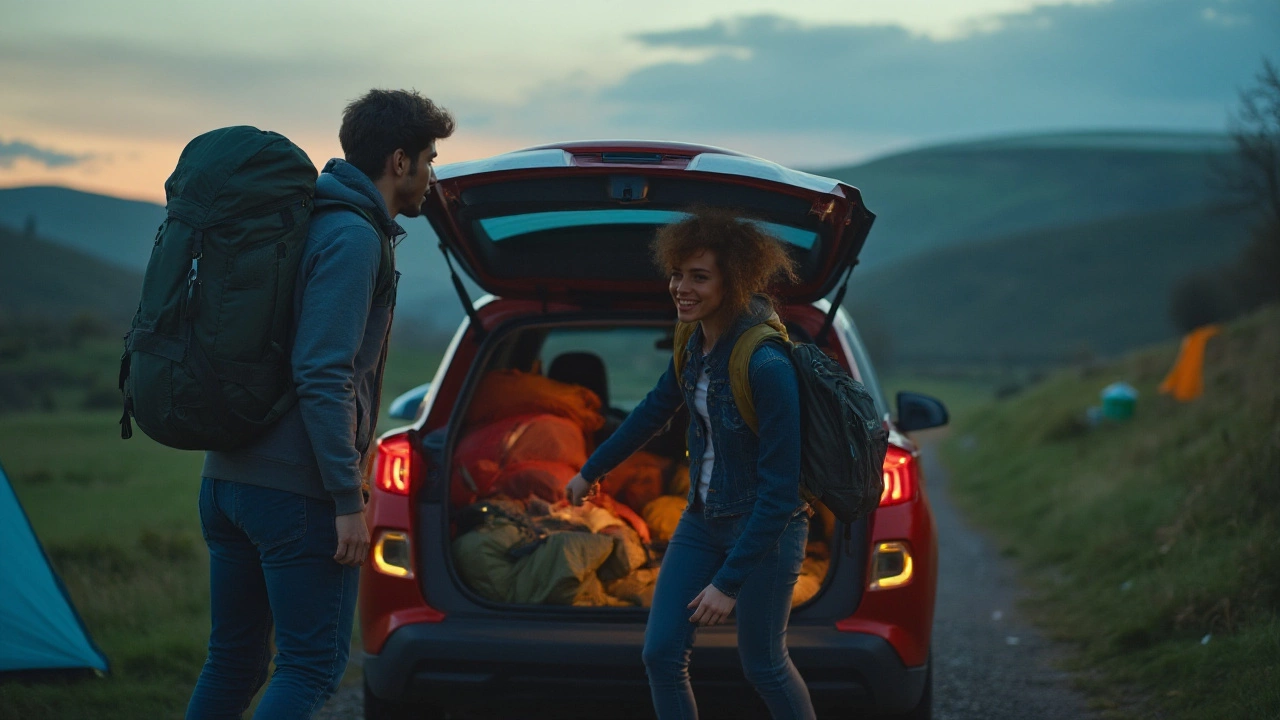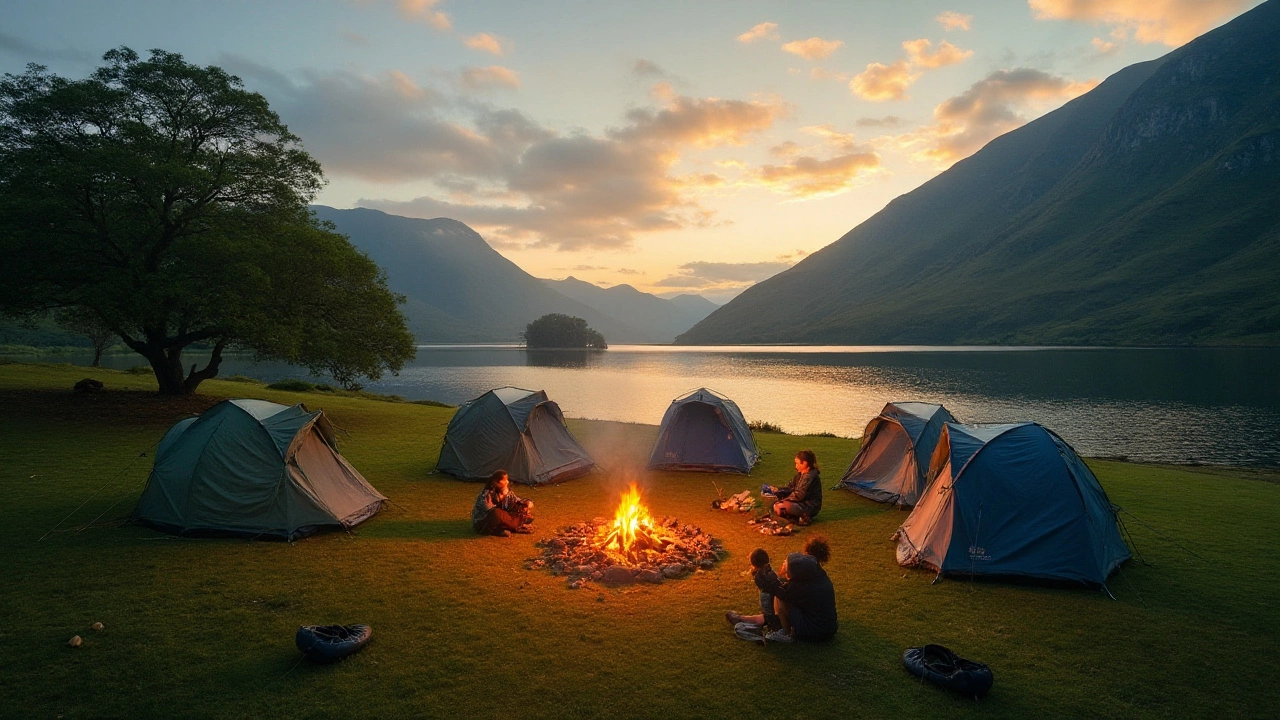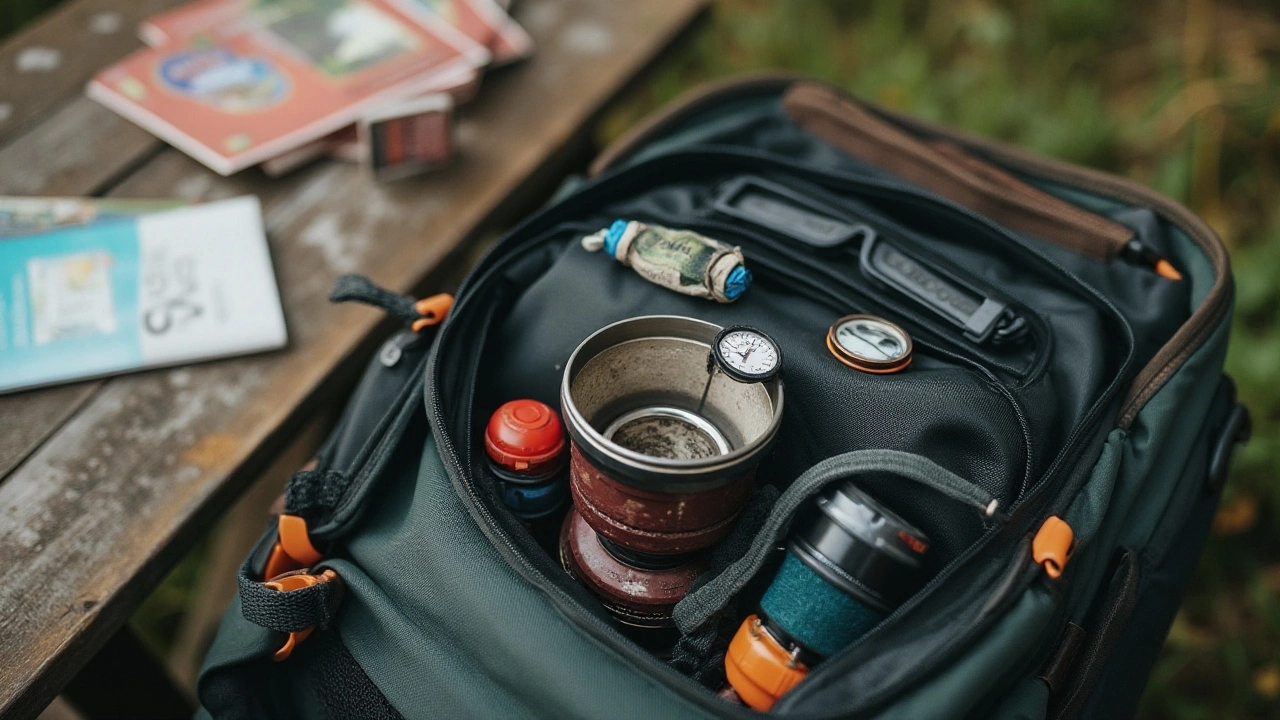Master the Art of Planning a Last Minute Camping Adventure
 Dec, 1 2024
Dec, 1 2024
There’s a particular thrill in deciding to drop everything for an impromptu escape into nature. The freedom, the spontaneity—it’s all part of the adventure. However, the idea of planning a last minute camping trip might seem overwhelming. But with a bit of preparation and quick thinking, you can chart a course for a memorable outdoor experience.
Whether you’re a seasoned camper or setting foot into nature for the first time, making sure you are prepared with the right tips and hacks is crucial. Think about where you’ll set up camp, what essential gear you might need, and what you’ll eat while out there. Gathering this information doesn't have to be a chore if you know where to start.
This guide is designed to help you navigate the logistics, from choosing the perfect spot to getting your gear in order quickly. So, take a deep breath, embrace the rush, and let's dive into how to make your last minute camping dream a delightful reality.
- Choosing Your Destination
- Packing Essentials Quickly
- Finding and Reserving Campsites
- Planning Meals on the Go
- Making the Most of Your Time Outdoors
Choosing Your Destination
Embarking on a spontaneous camping trip starts with picking the right destination. This is where the excitement brews and sets the tone for your entire adventure. But how does one decide on a whim where to go? First, consider the distance you're willing to travel. Time is of the essence, so opting for a location within a three-hour drive can maximize your adventure time. Local parks or lesser-known nature reserves often provide hidden gems that are just waiting to be explored. The beauty of last minute camping is the opportunity it offers to discover places you've never considered before. It can be that enchanting wooded area or a serene lakeside spot you stumbled upon in a friend's social media post or an old travel journal.
Weather plays a significant role in choosing your spot. A quick check on forecasts can save your trip from being washed out by an unanticipated rainstorm or a heatwave. Apps and websites like the Weather Channel or local meteorological services can provide reliable insights and help you make informed decisions. Another thing to think about is the type of camping you are interested in—be it pitching a tent, sleeping under the stars, or lounging in a hammock. Each preference comes with unique location possibilities. For instance, if you crave expansive night skies, open spaces away from city lights might be ideal, while forest enthusiasts may lean toward dense woodland areas for their lush, green canopy.
Then there’s the element of permitted activities. Some campsites allow fishing, kayaking, or hiking, while others have specific rules that might restrict these activities. Ensure any potential site meets your needs and interests. Mary's Creek near the Ozarks is popular for its breathtaking hiking trails and the crystal-clear creeks perfect for fishing. Equally, be mindful of any safety considerations like wildlife presence or terrain difficulty—novices might want accessible routes, whereas avid adventurers might seek out more challenging paths.
Lastly, reading reviews or reaching out to camping communities can offer invaluable insights. Many campers share their firsthand experiences on forums and blogs, providing tips and advice. As John Muir wisely stated in his writings,
"The mountains are calling and I must go."Online camping groups can steer you away from overcrowded spots, pointing you to quieter, more intimate settings. Sometimes, these groups even have real-time information about site availability, perfect for last-minute planners. Finding and reserving campsites come next, as some places fill up quickly, even on off-peak days.
Packing Essentials Quickly
When the call of the wild beckons at the last minute, effective packing is your best friend. You want to be swift yet thorough, ensuring you have everything you need without the luxury of days to ponder. Start with the basics by assessing the essentials—this includes shelter, clothing, food, and safety items. A trusty tent or a snug hammock should top your list for shelter. Consider the weather forecast and pack accordingly; a sleeping bag suited for the night temperatures is crucial. Last minute camping isn't about sacrificing comfort.
The next course of action is to tackle clothing. Think layers; they are versatile and essential. Start with moisture-wicking base layers to keep sweat at bay, then add on insulating layers such as fleece or wool, and top it off with a waterproof jacket. In addition to socks and sturdy boots, bring a hat and gloves even when going to a warmer climate, unpredictability is the theme of such ventures. The golden rule here is, pack light but be ready for anything. The experienced campers’ mantra, “cotton kills”, is worth remembering because cotton retains moisture and can cool you down dangerously when it's cold.
Food planning on short notice can be daunting, yet here the key lies in thinking simple and nutritional. Non-perishable goods should be your go-to, such as dried fruits, nuts, and energy bars. They require no cooking and are space-efficient. An essential on every camping trip is water, but don't rely solely on carrying bottled ones, especially if you are unsure about how close you'll be to water sources. Invest in a portable filter or purification tablets, because when you're out there, nothing is more vital than clean water. Cooking hot meals over a campfire is part of the charm—pack a lightweight portable stove and a basic cook set. Stick to one-pot recipes to minimize gear and cleanup.
As renowned adventurer Bear Grylls once put it, “In the heart of the wilderness, preparedness transforms the unpredictable into the exhilarating.” His words echo the sentiment that being well-prepared, even on short notice, amplifies the joy of the outdoor experience.
Prepare a small kit for safety and first aid, anticipating minor injuries native to the outdoor environment. A basic kit is usually composed of band-aids, antiseptic wipes, a pain reliever, tweezers, and a few other necessities. Keep it handy. It’s wise to also pack a dependable flashlight with extra batteries, a multi-tool, and a fire-starting kit. In some regions, insect repellent could be your peace-bringer during dusky hours. A lightweight tarp or emergency space blanket serves multiple purposes—rain cover, ground cloth, or simply extra warmth.
Staying organized is paramount. Use color-coded bags or transparent containers, which help distinguish categories without rummaging through everything when you've just arrived at your site. And do not underestimate the value of a checklist. Whether it's a digital version or an old-school paper list, ticking off items as you pack ensures nothing essential gets left behind in the rush. Though spontaneity is exciting, a little bit of order amidst the chaos guarantees a smoother camping trip.

Finding and Reserving Campsites
Embarking on a last minute camping trip might seem daunting, especially when it comes to securing a campsite. Yet, with modern technology and a little know-how, this task becomes more manageable. Start by exploring resources like Recreation.gov, which offers real-time availability for campsites across the United States. This platform not only provides information on various campsites but also allows you to filter them based on amenities and capacity, ensuring you find a spot that suits your needs. If you're open to spontaneity, state park websites often list first-come, first-served sites that don’t require reservations. It's a great way to explore lesser-known gems without the hassle of long-term planning.
Consider exploring apps like Hipcamp or Campendium, which connect campers with lesser-publicized camping options, including private lands and off-the-grid locations. These platforms are invaluable for last-minute planners, offering a broader range of choices, from traditional campgrounds to quirky glamping sites. Don’t hesitate to call campsites directly to check for last-minute cancellations, as these can be fortuitous opportunities.
According to an article in Outside Magazine, "The rise of technology in outdoor recreation has given way to a new era of camping accessibility, where booking a site in real-time is only a tap away."
For international destinations, take a look at Pitchup.com, which provides campsite listings worldwide with user reviews. This can give you insights into the experiences of others, helping ensure you aren't taking a complete shot in the dark. It's also wise to brush up on local regulations and camping norms, especially if you’re heading to an unfamiliar area. Some regions might have specific permit regulations or fire restrictions you must adhere to, so being informed will help prevent any last-minute hiccups in your plans.
Once you've found your desired location, swiftly move to secure your booking. Online websites and apps usually offer immediate confirmation, which is a blessing when time is of the essence. Should luck not be on your side for preferred spots, turn your attention to backcountry or dispersed camping options that often don’t require reservations. However, remember that these areas might demand more preparation and respect for nature, ensuring you follow Leave No Trace principles diligently.
In planning a successful spontaneous camping outing, a table with potential campsites, their locations, types, necessary permits, and amenities could be useful for quick reference:
| Site | Location | Type | Permit Required | Amenities |
|---|---|---|---|---|
| Yosemite National Park | California, USA | National Park | Yes | Water, toilets, park activities |
| Gl örtsjöarna | Sweden | Dispersed | No | None |
Approach each step with flexibility and an open mind. While you may not always land your first choice of campsite, each new spot offers a unique opportunity for adventure. Stay adaptive and enjoy the exciting unpredictability that comes with last minute camping.
Planning Meals on the Go
When it comes to last minute camping, one of the most exciting yet challenging aspects is planning your meals. You’ll want to keep it simple and efficient without sacrificing flavor or nutrition. The first thing to consider is creating a menu that revolves around non-perishable items. Canned beans, dried pasta, and instant oatmeal are lifesavers that bring ease to meal planning. But don’t just stick to the basics. Think about incorporating some fresh produce that can last a couple of days without refrigeration, like carrots, apples, and bell peppers, which can provide a crunchy addition to your meals.
Another strategy is to think in terms of meals that can be repurposed. For example, if you’re tossing together a salad for lunch, the leftovers can be stuffed into a wrap for dinner. Try to focus on meals that can be quickly adapted or enhanced with added ingredients. A sturdy skillet or a Dutch oven can be your best friends—use it to whip up anything from hearty stews to a quick stir-fry. Sticking to one-pot meals not only makes cooking simpler but also cuts down on the washing up, leaving you more time to enjoy the great outdoors.
An essential tip before you set off is to keep a mix of precooked or ready-to-eat meals in your bag. The hustle of last minute camping shouldn’t mean compromising on comfort foods. Consider capturing some flavors of home with vacuum-sealed soups or prepackaged quinoa bowls. These convenient meals require minimal effort at the campsite, allowing you to refuel and relax efficiently. An added advantage of pre-packed meals is that they reduce the need for cleanup, which makes your spontaneous getaway that much more enjoyable.
Spontaneous camping trips often leave you without time to pack a gourmet kitchen, but there’s something incredibly satisfying about cooking over an open flame. Embrace the simplicity of campfire cooking by preparing classic dishes like skewered kebabs or foil-wrapped fish. It’s as much about the experience and ambiance as it is about the food itself. To add an element of fun, bring along a few spices and herbs to season your meals—everything tastes better when cooked outdoors.
Snack smart, think about incorporating lightweight snacks that provide quick energy, such as nuts, dried fruits, and granola bars. These snacks should be easy to grab and enjoy whenever hunger strikes. They’re especially great when you’re out exploring during the day and need a quick pick-me-up. Another pro tip is to carry some peanut butter or almond butter packets, which work wonders as a spread, a dipping sauce, or even a quick protein boost straight from the packet.

Making the Most of Your Time Outdoors
Embracing the great outdoors is as much about enjoying the present moment as it is about the journey itself. One of the most effective ways to make the most of your camping trip is to plan for a range of activities that allow you to connect with the environment and the people around you. People often forget the simple joy of a leisurely hike or the excitement of spotting wildlife. If hiking is on the agenda, choose trails that match your fitness level while offering scenic views, ensuring you're both challenged and rewarded. Keep a list of amazing views or hidden nooks that locals or previous campers might have recommended—it's always fun to discover a spot off the beaten path. As you hike, take time to appreciate the small wonders of nature, like the intricate patterns of leaves or the vibrant colors of a sunset.
Immersing yourself in nature also involves leaving technology behind. It’s a time to disconnect and let go of digital distractions. Without the constant ping of notifications, nature sounds—be it the chirping of birds or the rustling of leaves—become the soundtrack of your adventure. Capturing memories with a camera is great, but try balancing this with just savoring experiences in real-time. Build a campfire if allowed—its warmth and glow are perfect for nighttime stories and roasting marshmallows. Interestingly, sharing narratives around a fire can strengthen bonds, and it is one of the oldest traditions of human gatherings.
For those who crave structure, planning activities such as fishing, bird watching, or star gazing can provide a framework for adventure. Consider bringing along a journal to document your discoveries. Recording your thoughts about a camping trip can be a therapeutic exercise, and it's nice to look back at the moments that were particularly special. If stargazing captures your imagination, research constellations you might see and download a simple star map to take with you. According to NASA, the best stargazing happens away from city lights, where the night sky displays its deepest clarity.
"In wilderness lies the hope of the world." – John Muir, naturalist and advocate for wilderness preservation.
| Activity | Optimal Time | Benefit |
|---|---|---|
| Hiking | Morning | Cardiovascular health and scenic enjoyment |
| Fishing | Early morning or evening | Relaxation and patience |
| Star gazing | Night | Mental clarity and wonder |
Cultivating a sense of adventure underlines the charm of camping, so don't be too rigid with your itinerary. Allow room for spontaneous decisions—they often lead to the most memorable moments. Whether it's discovering a hidden waterfall or an unexpected wildlife encounter, these surprises pepper your experience with joy and excitement. Engage in local folklore or traditions if your campsite is near towns or communities with rich histories. You might find fascinating tales that connect people to the land in surprising ways. Remember, whether you embark on a long hike, try your hand at fishing, or choose simply to relax by the campfire, the primary aim is to savor the simplicity and beauty that nature offers us. Such feelings ultimately reframe our life perspective, often leaving us rejuvenated and inspired.